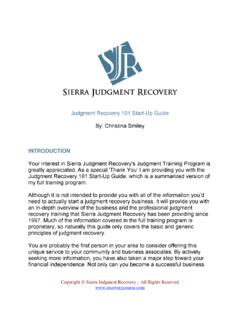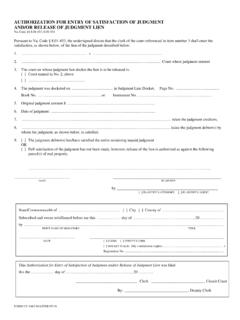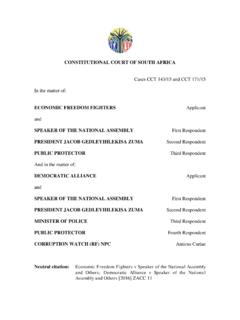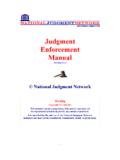Transcription of HIGH COURT OF SOUTH AFRICA (GAUTENG …
1 HIGH COURT OF SOUTH AFRICA . ( gauteng division , pretoria ). Reportable/Not of interest to other Judges CASE NO: 83145/2016. In the matter between: In the matter between: DEMOCRATIC ALLIANCE Applicant and MINISTER OF INTERNATIONAL RELATIONS. AND COOPERATION First Respondent MINISTER OF JUSTICE AND. CORRECTIONAL SERVICES Second Respondent PRESIDENT OF THE REPUBLIC. OF SOUTH AFRICA Third Respondent SPEAKER OF THE NATIONAL ASSEMBLY Fourth Respondent CHAIRPERSON OF THE NATIONAL COUNCIL. OF PROVINCES Fifth Respondent SOUTH AFRICAN LITIGATION CENTRE Sixth Respondent PROFESSOR JOHN DUGARD AND. PROFESSOR GUENAEL METTRAUX Seventh Respondent AMNESTY INTERNATIONAL LIMITED Eighth Respondent PEACE AND JUSTICE INITIATIVE AND. CENTRE FOR HUMAN RIGHTS Ninth Respondent HELEN SUZMAN FOUNDATION Tenth Respondent COUNCIL FOR THE ADVANCEMENT OF THE.
2 SOUTH AFRICAN CONSTITUTION Intervening Party 2. Heard: 5 and 6 December 2016. Delivered: 22 February 2017. Coram: Mojapelo DJP, Makgoka and Mothle JJ. Summary: International treaty Rome Statute of the International Criminal COURT . notice of withdrawal in terms of article 127(1) Section 231 of the Constitution of the Republic of SOUTH AFRICA whether the power of the national executive to negotiate and sign an international treaty includes the power to withdraw from such treaty without prior parliamentary approval whether parliamentary approval may be sought after notice of withdrawal had been delivered to the United Nations. _____. ORDER. Mojapelo DJP, Makgoka and Mothle JJ (sitting as a Full Bench and COURT of first instance): 1. The notice of withdrawal from the Rome Statute of the International Criminal COURT , signed by the first respondent, the Minister of International Relations and Cooperation on 19 October 2016, without prior parliamentary approval, is unconstitutional and invalid.
3 2. The cabinet decision to deliver the notice of withdrawal to the United Nations Secretary-General without prior parliamentary approval, is unconstitutional and invalid;. 3. The first, second and third respondents the Minister of International Relations and Cooperation, the Minister of Justice and Correctional Services and the President of the Republic of SOUTH AFRICA , are ordered to forthwith revoke the notice of withdrawal referred in paragraph 1 above;. 3. 4. The first, second and third respondents are ordered to pay the applicant s costs, including costs consequent upon employment of two counsel;. 5. There is no costs order as between the intervening applicant, the first, second, third, sixth, ninth and tenth respondents. _____. JUDGMENT. _____. THE COURT . [1] This case turns on the separation of powers between the national executive and parliament in international relations and treaty-making.
4 It calls for a proper interpretation of s 231 of the Constitution of the Republic of SOUTH AFRICA , 1996 (the Constitution). The primary question is whether the national executive s power to conclude international treaties, also includes the power to give notice of withdrawal from international treaties without parliamentary approval. Related to that is an ancillary question whether it is constitutionally permissible for the national executive to deliver a notice of withdrawal from an international treaty without first repealing the domestic law giving effect to such treaty. At the heart of the dispute is the withdrawal of SOUTH AFRICA from the Rome Statute of the International Criminal COURT (the ICC). [2] The litigation history over the ICC has its genesis in the refusal by the SOUTH African government to arrest and surrender to the ICC, Omar Hassan Ahmad al- Bashir (President al-Bashir) the President of Sudan, when he visited the country in June 2015 for an African Union (AU) summit.
5 President al-Bashir stands accused of serious international crimes, and two warrants have been issued by the pre-trials chamber of the ICC for his arrest. They all are for war crimes, crimes against humanity and genocide, all related to events in the Darfur region of Sudan. The warrants have been forwarded to member states, including SOUTH AFRICA , requesting them to cooperate under the Rome Statute and cause President al-Bashir to be arrested and surrendered to the ICC. 4. [3] Government s failure in this regard led to an urgent application in this COURT by SOUTH African Litigation Centre (SALC), in which it sought orders declaring the government s failure to be in breach of the Constitution, and to compel the government to cause President al-Bashir to be arrested and surrendered to the ICC. Government s stance was that President al-Bashir enjoyed immunity in terms of international customary law.
6 A Full Bench of this COURT eventually granted an order declaring the government s failure to have President al-Bashir arrested and surrendered to the ICC to be inconsistent with the Constitution and The appeal by the government to the Supreme COURT of Appeal was unsuccessful, 2 after which an application for leave to appeal was made to the Constitutional COURT . 3 That application, which was scheduled to be heard by the Constitutional COURT on 22. November 2016, has been withdrawn by government. Background facts [4] On 19 October 2016, the national executive took a decision to withdraw from the Rome Statute. Pursuant thereto and on the same day, the Minister of International Relations signed a notice of withdrawal to give effect to that decision and deposited it with the Secretary-General of the United Nations.
7 This triggered the process for SOUTH AFRICA s withdrawal. In terms of article 127(1) of the Rome Statute, the withdrawal of a party state from the Rome Statute takes effect 12 months after the depositing of a notice to that effect. Thus, SOUTH AFRICA would cease to be state party to the statute in October 2017. Attached to the explanatory statement is a lengthy explanation in which the reasons for the withdrawal are set out. In part, the statement reads: In 2015, SOUTH AFRICA found itself in the unenviable position where it was faced with conflicting international law obligations which had to be interpreted within the realm of hard diplomatic realities and overlapping mandates when SOUTH AFRICA hosted the 30th Ordinary Session of the Permanent Representatives Committee, the 27th 1. Southern AFRICA Litigation Centre v Minister of Justice and Constitutional Development & others [2015] 3 All SA 505 (GP); 2015 (9) BCLR 1108 (GP); 2015 (2) SA 1 (GP).
8 2. Minister of Justice and Constitutional Development & others v The Southern AFRICA Litigation Centre [2016] 2 All SA 365 (SCA); 2016 (4) BCLR 487 (SCA); 2016 (3) SA 317 (SCA). 3. Minister of Justice and Constitutional Development and Others v Southern AFRICA Litigation Centre and Others (CCT 75/16). 5. Ordinary Session of the Executive Council and the 25th Ordinary Session of the Assembly of the African Union ("the AU Summit"), from 7 to 15 June 2015. SOUTH AFRICA was faced with the conflicting obligation to arrest President Al Bashir under the Rome Statute, the obligation to the AU to grant immunity in terms of the Host Agreement, and the General Convention on the Privileges and Immunities of the Organization of African Unity of 1965 as well as the obligation under customary international law which recognises the immunity of sitting heads of state.
9 This Act and the Rome Statute of the International Criminal COURT compel SOUTH AFRICA to arrest persons who may enjoy diplomatic immunity under customary international law but who are wanted by the International Criminal COURT for genocide, crimes against humanity and war crimes and to surrender such persons to the International Criminal COURT . SOUTH AFRICA has to do so, even under circumstances where we are actively involved in promoting peace, stability and dialogue in those countries.. [5] On 20 and 21 October 2016 respectively, the Minister of Justice wrote identical letters to both the Speaker of the National Assembly (the fourth respondent). and the Chairperson of the National Council of Provinces (the fifth respondent). advising them of cabinet s decision to withdraw from the Rome Statute, and the reasons therefor.
10 In those letters, the Minister also stated his intention to table in parliament, a bill repealing the Implementation of the Rome of Statute of the International Criminal COURT Act 27 of 2002 (the Implementation Act) which is the domestic law giving effect to the Rome Statute in SOUTH AFRICA . [6] On 24 October 2016 the applicant launched an application for direct access to the Constitutional COURT seeking to challenge the executive s decisions referred to above. It also launched a substantively identical application in this COURT , in the alternative, in the event of the Constitutional COURT not granting direct access to it. On 11 November 2016 the Constitutional COURT refused the application for direct access on the basis that it was not in the interest of justice to hear the matter at this stage. As a result the applicant fell back on its application in this COURT .
















